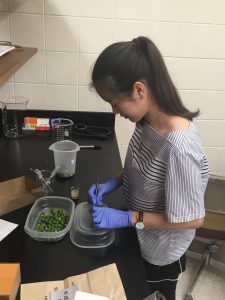Lin Song joined the Endelman Lab in 2018 as a new MS student, after completing her BS degree at UC Davis. She is already busy laying the foundation for our diploid potato breeding program.

At present, commercial potato varieties and elite breeding stocks are heterozygous, autotetraploid clones maintained in vitro. Although there are exciting new developments for molecular breeding at the tetraploid level (e.g., genomic selection), we are working with other researchers to create a new paradigm for potato breeding based on inbred, diploid lines that can be sexually hybridized to generate true potato seed (TPS) of F1 hybrid varieties. There are many benefits of inbred lines for breeding and genetics research, including more rapid discovery and introgression of beneficial genes from exotic germplasm, more efficient storage of germplasm as true seed, and more economical genotyping. The phytosanitary and freight advantages of TPS have been recognized for decades, but previous attempts to commercialize TPS-varieties based on autotetraploid parents have been unsuccessful.
